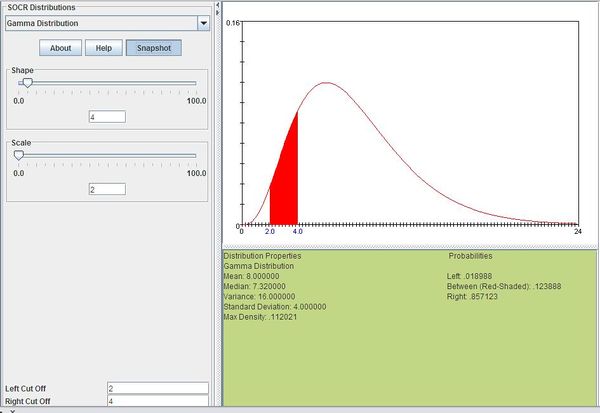Difference between revisions of "AP Statistics Curriculum 2007 Gamma"
m (→Normal Approximation to Gamma distribution) |
m (→Normal Approximation to Gamma distribution) |
||
| Line 63: | Line 63: | ||
===Normal Approximation to Gamma distribution=== | ===Normal Approximation to Gamma distribution=== | ||
| − | Note that if \( \{X_1,X_2,X_3,\cdots \}\) is a sequence of independent [[AP_Statistics_Curriculum_2007_Exponential|Exponential random variables]] then \(Y_k = \sum_{i=1}^k{X_i} \) is a [http://www.math.uah.edu/stat/special/Gamma.html random variable with gamma distribution with some shape parameter], k (positive integer) and scale parameter b. By the [[AP_Statistics_Curriculum_2007_Limits_CLT|central limit theorem]], if k is large, then gamma distribution can be approximated by the normal distribution with mean \(\mu=kb\) and variance \(\sigma =kb^2\). That is, the distribution of the variable | + | Note that if \( \{X_1,X_2,X_3,\cdots \}\) is a sequence of independent [[AP_Statistics_Curriculum_2007_Exponential|Exponential random variables]] then \(Y_k = \sum_{i=1}^k{X_i} \) is a [http://www.math.uah.edu/stat/special/Gamma.html random variable with gamma distribution with some shape parameter], k (positive integer) and scale parameter b. By the [[AP_Statistics_Curriculum_2007_Limits_CLT|central limit theorem]], if k is large, then gamma distribution can be approximated by the normal distribution with mean \(\mu=kb\) and variance \(\sigma =kb^2\). That is, the distribution of the variable \(_k={{Y_k-kb}\over{\sqrt{k}b}}\) tends to the standard normal distribution as <math>k\longrightarrow \infty</math>. |
<hr> | <hr> | ||
Revision as of 12:03, 23 June 2012
Contents
General Advance-Placement (AP) Statistics Curriculum - Gamma Distribution
Gamma Distribution
Definition: Gamma distribution is a distribution that arises naturally in processes for which the waiting times between events are relevant. It can be thought of as a waiting time between Poisson distributed events.
Probability density function: The waiting time until the hth Poisson event with a rate of change \(\lambda\) is
\[P(x)=\frac{\lambda(\lambda x)^{h-1}}{(h-1)!}{e^{-\lambda x}}\]
For \(X\sim \operatorname{Gamma}(k,\theta)\!\), where \(k=h\) and \(\theta=1/\lambda\), the gamma probability density function is given by
\[\frac{x^{k-1}e^{-x/\theta}}{\Gamma(k)\theta^k}\]
where
- e is the natural number (e = 2.71828…)
- k is the number of occurrences of an event
- if k is a positive integer, then \(\Gamma(k)=(k-1)!\) is the gamma function
- \(\theta=1/\lambda\) is the mean number of events per time unit, where \(\lambda\) is the mean time between events. For example, if the mean time between phone calls is 2 hours, then you would use a gamma distribution with \(\theta\)=1/2=0.5. If we want to find the mean number of calls in 5 hours, it would be 5 \(\times\) 1/2=2.5.
- x is a random variable
Cumulative density function: The gamma cumulative distribution function is given by
\[\frac{\gamma(k,x/\theta)}{\Gamma(k)}\]
where
- if k is a positive integer, then \(\Gamma(k)=(k-1)!\) is the gamma function
- \(\textstyle\gamma(k,x/\theta)=\int_0^{x/\theta}t^{k-1}e^{-t}dt\)
Moment generating function: The gamma moment-generating function is
\[M(t)=(1-\theta t)^{-k}\!\]
Expectation: The expected value of a gamma distributed random variable x is
\[E(X)=k\theta\!\]
Variance: The gamma variance is
\[Var(X)=k\theta^2\!\]
Applications
The gamma distribution can be used a range of disciplines including queuing models, climatology, and financial services. Examples of events that may be modeled by gamma distribution include:
- The amount of rainfall accumulated in a reservoir
- The size of loan defaults or aggregate insurance claims
- The flow of items through manufacturing and distribution processes
- The load on web servers
- The many and varied forms of telecom exchange
The gamma distribution is also used to model errors in a multi-level Poisson regression model because the combination of a Poisson distribution and a gamma distribution is a negative binomial distribution.
Example
Suppose you are fishing and you expect to get a fish once every 1/2 hour. Compute the probability that you will have to wait between 2 to 4 hours before you catch 4 fish.
One fish every 1/2 hour means we would expect to get \(\theta=1 / 0.5=2\) fish every hour on average. Using \(\theta=2\) and \(k=4\), we can compute this as follows:
\[P(2\le X\le 4)=\sum_{x=2}^4\frac{x^{4-1}e^{-x/2}}{\Gamma(4)2^4}=0.12388\]
The figure below shows this result using SOCR distributions

Normal Approximation to Gamma distribution
Note that if \( \{X_1,X_2,X_3,\cdots \}\) is a sequence of independent Exponential random variables then \(Y_k = \sum_{i=1}^k{X_i} \) is a random variable with gamma distribution with some shape parameter, k (positive integer) and scale parameter b. By the central limit theorem, if k is large, then gamma distribution can be approximated by the normal distribution with mean \(\mu=kb\) and variance \(\sigma =kb^2\). That is, the distribution of the variable \(_k={{Y_k-kb}\over{\sqrt{k}b}}\) tends to the standard normal distribution as \(k\longrightarrow \infty\).
- SOCR Home page: http://www.socr.ucla.edu
Translate this page: